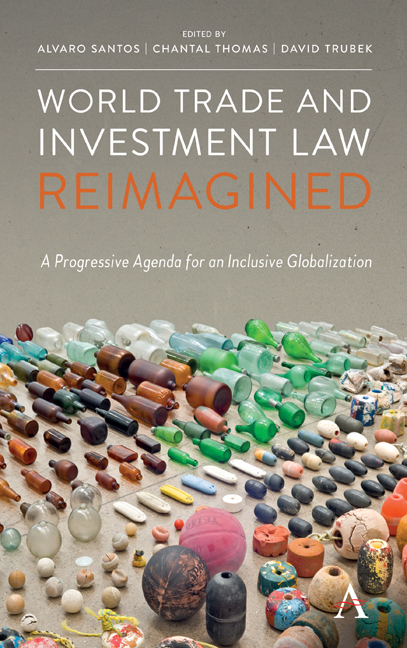Book contents
- Frontmatter
- Contents
- Acknowledgments
- List of Contributors
- Introduction World Trade and Investment Law in a Time of Crisis: Distribution, Development and Social Protection
- PART I RETHINKING THE POLITICAL ECONOMY OF TRADE: COMMENTS ON DANI RODRIK'S STRAIGHT TALK ON TRADE
- Chapter One Comments on Straight Talk on Trade
- Chapter Two Thoughts on Straight Talk on Trade
- Chapter Three Reading Rodrik: A Call for a New Law and Economics for International Law
- Chapter Four Reflecting on Straight Talk on Trade
- Chapter Five A Response to the Comments by Thomas, Gallagher, Shaffer and Santos
- PART II SETTING THE STAGE FOR A PROGRESSIVE VISION: EMERGING ISSUES IN WORLD TRADE AND INVESTMENT LAW
- SECTION 1 MAPPING THE NEW CONTEXT FOR TRADE AND INVESTMENT LAW
- SECTION 2 DEALING WITH MAJOR CHANGES IN THE WORLD ECONOMY
- SECTION 3 FRAMING A MORE EQUITABLE INVESTMENT LAW REGIME
- SECTION 4 SUPPORTING DEVELOPMENT
- SECTION 5 REINFORCING SOCIAL PROTECTION: SPREADING THE BENEFITS OF TRADE, DEALING WITH LOSSES AND EXPLORING THE TRADE–IMMIGRATION NEXUS
- Index
Chapter One - Comments on Straight Talk on Trade
from PART I - RETHINKING THE POLITICAL ECONOMY OF TRADE: COMMENTS ON DANI RODRIK'S STRAIGHT TALK ON TRADE
Published online by Cambridge University Press: 07 September 2019
- Frontmatter
- Contents
- Acknowledgments
- List of Contributors
- Introduction World Trade and Investment Law in a Time of Crisis: Distribution, Development and Social Protection
- PART I RETHINKING THE POLITICAL ECONOMY OF TRADE: COMMENTS ON DANI RODRIK'S STRAIGHT TALK ON TRADE
- Chapter One Comments on Straight Talk on Trade
- Chapter Two Thoughts on Straight Talk on Trade
- Chapter Three Reading Rodrik: A Call for a New Law and Economics for International Law
- Chapter Four Reflecting on Straight Talk on Trade
- Chapter Five A Response to the Comments by Thomas, Gallagher, Shaffer and Santos
- PART II SETTING THE STAGE FOR A PROGRESSIVE VISION: EMERGING ISSUES IN WORLD TRADE AND INVESTMENT LAW
- SECTION 1 MAPPING THE NEW CONTEXT FOR TRADE AND INVESTMENT LAW
- SECTION 2 DEALING WITH MAJOR CHANGES IN THE WORLD ECONOMY
- SECTION 3 FRAMING A MORE EQUITABLE INVESTMENT LAW REGIME
- SECTION 4 SUPPORTING DEVELOPMENT
- SECTION 5 REINFORCING SOCIAL PROTECTION: SPREADING THE BENEFITS OF TRADE, DEALING WITH LOSSES AND EXPLORING THE TRADE–IMMIGRATION NEXUS
- Index
Summary
Dani Rodrik's Straight Talk on Trade: Ideas for a Sane World Economy ably synthesizes complex ideas and distills them into clear and common sense— in other words, straight talk. Rodrik's writing warrants high admiration both for this synthetic quality as well as for some of the counterintuitive or provocative arguments (from an orthodox economist's perspective) that he makes: the talk offered by this book seeks to upend much conventional wisdom in economics and politics. These analytic qualities will be familiar to fans of Rodrik's extensive body of earlier work. Here, as well as in earlier work, they span with seeming effortlessness a vast geographic range, moving across countries and regions in both the Global North and the Global South.
It would be difficult to do justice to the rich and variegated insights in Straight Talk on Trade. I will comment on only two of the many arguments Rodrik presents in the book, focusing on developed and developing countries, respectively. The first of Rodrik's arguments that I want to address is the assertion that developed states should privilege national policy space over hyperglobalization; I will ask about the significance of the turn to global value chains. The second argument is that industrialization may no longer be possible for developing countries; I will ask whether flexibility in both the law (General Agreement on Tariffs and Trade/ World Trade Organization (GATT/ WTO)) and the economics (the effects of localization) warrants a reexamination of the possibility.
Straight Talk for Developed States: National Policy Space Should Prevail Over Cosmopolitan Fantasies
Rodrik bracingly upbraids contemporary “elites and technocrats” for what he deems an obsession with “hyperglobalization” at the expense of economic policy that is more flexible, and therefore more sensible and more sustainable. He writes, “We— the world's financial, political and technocratic elite— distanced ourselves from our compatriots and lost their trust.” This lament expresses the core of the allegations of political and ideological irresponsibility that Rodrik lays at the feet of the governors of today's global economy. Rodrik's reference to “compatriots” is by no means incidental: this book in many ways offers a full-throated defense of the nation-state.
- Type
- Chapter
- Information
- World Trade and Investment Law ReimaginedA Progressive Agenda for an Inclusive Globalization, pp. 31 - 36Publisher: Anthem PressPrint publication year: 2019

